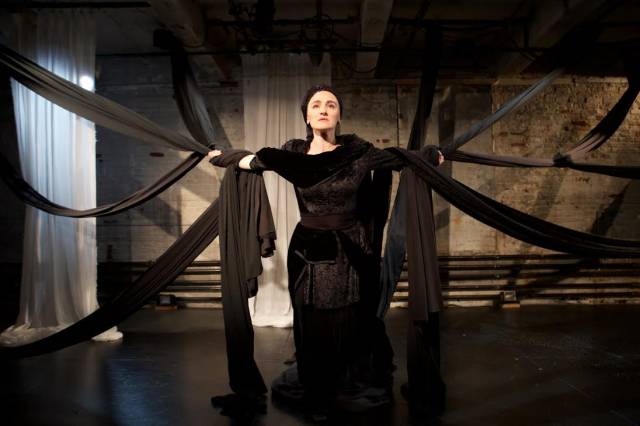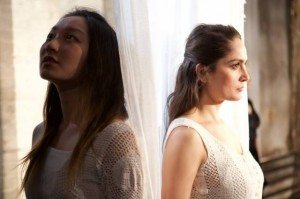

Blessed Unrest and Teatri ODA of Kosova bring to the stage Doruntine, a mythical tale that traverses contemporary situations and evokes emotions that are often complicated and unresolved. The bilingual production doesn't make any concessions for non-Albanian speakers, yet despite the text being light on English dialogue, so much of what happens on stage can be understood and deeply felt. Though Albanian may not be commonly heard on the multicultural streets and stages of New York, it has a strange and compelling familiarity that carries a certain sadness fitting to the tale.
The intimate collaboration between the two companies has translated into a very physical performance, relying on both traditional and contemporary choreography to heighten the piece co-written by Lirak Ҫelaj and Matt Opatrny. The actors share characters, with one actor speaking in Albanian and the other in English. The transition is smooth, with directors Jessica Burr and Florent Mehmeti giving ample opportunities for the audience to gauge the structure of the simultaneous translation and dialogue.

The play tells the story of Doruntine (shared by Njomëza Ibraj Fetiu in Albanian and Poppy Liu in English), who falls in love with a man from a foreign land (Nathan Richard Wagner), and decides to marry and move away from her mother and nine brothers. Before Doruntine leaves, one of her brothers, Constantine (Eshref Durmishi and Kevin Chu), gives their mother an unbreakable pledge that whenever Doruntine is needed at home he will bring her back. And so he does. After three years Constantine brings Doruntine back to her grieving mother who has lost all her nine sons, including Constantine who has risen from the dead to guide Doruntine back to her country, to her traditional roots, and to her mother.
The production uses a simple set, with black and white drapes that at times cover the actors themselves. Dressed in white, the actors in some moments look like ghosts -- representing both those they are mourning and their own spiritual departure from the land and their community. The only exception is Lady Mother (Ilire Ҫelaj) who wears a black mourning dress, and as both a widower and a grieving mother, she symbolizes the loss of Albanian's future generations due to war. From a contemporary perspective, we can read this war as the unrest in Balkan region during the 90s; yet this is never explicitly stated, making the piece feel like even more of a fable and representing the struggles that Albanians had to endure not only in the 20th century, but long before than as well.